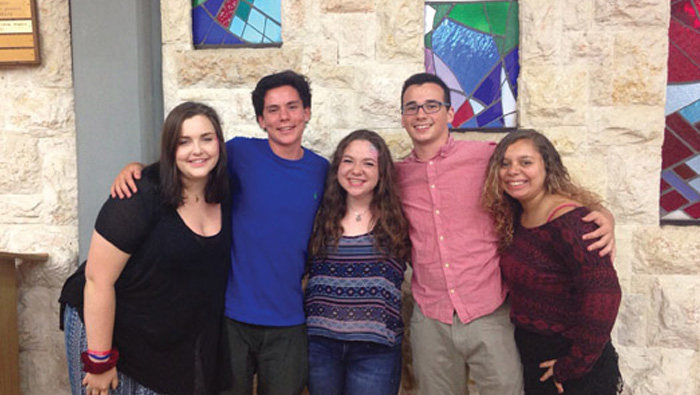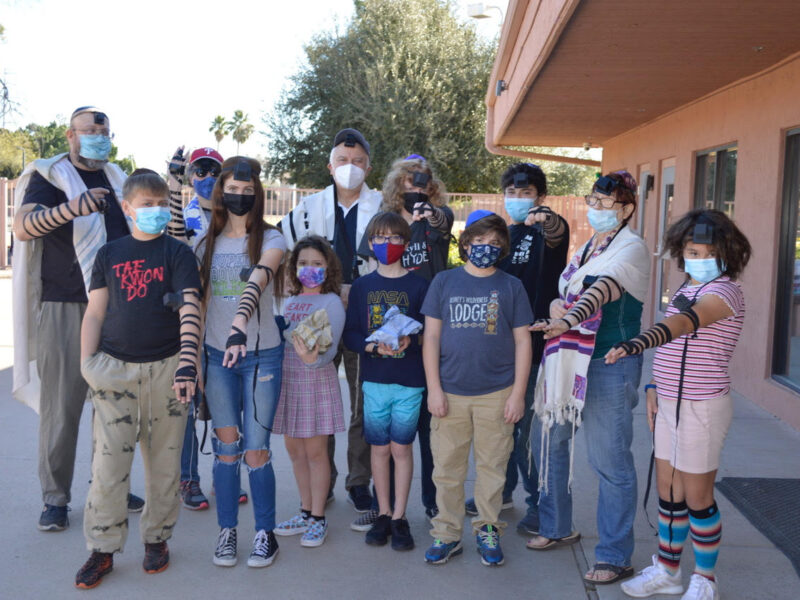Five Arizona teens spent the summer before their senior year exploring Israel and 4,000 years of Jewish history at the Alexander Muss High School in Israel.
AMHSI, which is now a part of Jewish National Fund, is an accredited English-language, semester-abroad program for high school students where the land of Israel becomes a living classroom. Madeline Stull, Reuben Nach, Madyssen Zarin, Gabriel Friedland and Rachael Weinstein received the first Schwartz/Hammer AMHSI/JNF IMPACT Fellowships to attend the school’s six-week summer program. This was the first year of the three-year fellowship created by a generous donation of $150,000 from the Schwartz-Hammer Foundation.
“The Schwartz-Hammer AMHSI Impact Fellowship will have a lasting impact on the Valley’s Jewish community and our future leadership by developing a deep-rooted connection between Arizona Jewish youth, Israel and the Jewish people,” says Shelia Schwartz. “I am excited that this dream has now become a reality as JNF and AMHSI continue to work towards ensuring that Israel education is an option for all Arizona Jewish teens.”
The Schwartz-Hammer AMHSI Impact Fellowship is the first of its kind and will be a part of the JNF-AMHSI Impact Fund, a network of merit fellowships for high school students to form their own sense of Jewish peoplehood as the next generation of Jewish leaders. Over three summers, the fellowship will provide a total of 15 Arizona high school Jewish teens with an opportunity to attend the AMHSI six-week summer session all expenses paid – from tuition to housing costs to trip costs to airfare – with the expectation that these fellows will return to make an impact on their communities.
This fellowship is open to Arizona residents entering their senior year of high school at the time of travel. The applications for the 2016 Schwartz/Hammer AMHSI/JNF IMPACT Fellowship Fund are due by Jan. 1, 2016. For more information on the Impact Fellowship, visit amhsi.org/impact-fund or contact drochford@jnf.org or 480-447-8100, ext. 980. For information about AMHSI, visit amhsi.org.
In addition to receiving the Impact Fellowship, Madeline Stull is also a StandWithUs-MZ Teen Intern. The daughter of Wendy Stull, Madeline attends Horizon High School in Scottsdale.
The MZ Teens program is a high school leadership program that prepares students for the challenges they may face regarding Israel in college and in their communities. Students participate in a yearlong program and receive guidance and funding to run programming in their high schools and youth groups.
Reuben Zeitzer Nach lives in Phoenix and attends Sunnyslope High School. He is a member of Temple Solel and the New Shul.
Rachael Ilyssa Weinstein attends Ironwood Ridge High School in Oro Valley. The daughter of Brenda and Ivan Weinstein, she attends Congregation Anshei Israel.
Gabriel Friedland attends Desert Mountain High School in Scottsdale. Gabe and his parents, Steven and Vivian, are affiliated with Congregation Or Tzion.
Madyssen Lorraine Zarin attends University High School in Tucson. She and her parents, Ira and Patricia, belong to Congregation Anshei Israel.
Whether they had heard about the scholarship from a relative, youth group, Hebrew High or JNF, all of the teens say applying for this amazing opportunity was too good to pass up. Reuben noted that previous summers have been devoted to basketball, but he wasn’t going to waste such an awesome opportunity. Madyssen says she wanted to have an experience that mirrored the life of a student or even citizen of Israel as opposed to a tourist.
All of the teens plan to return to Israel, some as early as next year. Gabriel says, “I’m 110% sure I’ll return to Israel very soon, my family is already planning a trip for next summer.” Madyssen is already planning to make Aliyah: “The details are definitely still being worked out, but assuming all goes as planned, next year I will be joining Garin Tzabar. With the help of this lone soldier program, I will make Aliyah and serve two years in the army.” Rachel says she plans to return more than once: “Israel is somewhere I will always want to visit again and again.”
Following are the teens’ replies (edited for brevity and clarity) to some of the other questions we posed to them at the end of their journey.
What was the highlight of the summer?
Madeline: My highlight was definitely Masada. Although a cliché answer, mine is for a different reason. Alexander Muss emphasizes education to enrich the experience. I truly believe Masada is a perfect example of how the education makes the experience much more meaningful.
Reuben: Wow! That’s hard to choose. However two experiences stood out: climbing Masada and spending Shabbat in Jerusalem. Shabbat in Jerusalem was a blast. From dancing like crazy at the Western Wall to roaming the Shuk, I could not think of a better way to spend Shabbat.
Rebecca: One moment that gives me goosebumps is when we stopped at an overlook of Jerusalem. Looking over this historical and emotional place, we all sang “Yerushalayim Shel ZahaV.” Singing about the gorgeous city as we gazed upon it is something that I will always remember. Another highlight was that I had the unique opportunity to ride and train with a horse while I was in Israel (I have a horse at home). Being able to run in the field atop an Israeli horse while the sun sets – there are no words that describe that feeling.
Gabriel: I think the highlight of my summer was my realization about Israel. Before my trip, I knew almost nothing about my people’s connection to the land and the relevance it plays on my life today.
Madyssen: My highlight of the summer was attending the Knafayim Shel Krembo benefit concert. The proceeds went to the youth movement that pairs kids with disabilities with other children their age. Together they partake in activities ranging from large group events to one-on-one bonding.
What most surprised you about Israel?
Madeline: This was my third time going to Israel, but what surprises me every time is the laid-back and friendly culture.
Reuben: The difficulty and amount of time the process of creating a Jewish state took surprised me the most.
Rachel: Children have a lot of freedom. When you go into town or really anywhere, the children are allowed to be on their own. In America, people baby their children and are overly cautious, whereas in Israel there are just young kids by themselves in big cities. Very surprising.
Madyssen: Although I have been there before, I was still in awe about the personality of the people. To me, they just seem real. They understand what real issues are, like the need for safety, the sanctity of life and the importance of community.
Do you feel closer to Israel now?
Madeline: Yes, definitely.
Reuben: Before, I had a strong connection with Judaism, yet I did not have much of a connection with Israel. Now I know how hard the Jewish people worked to receive their own state. Seeing all the work that was put into making a Jewish state truly bolstered my connection with Israel.
Rachel: I feel way closer to Israel now. I lived here, I was immersed in the culture and society. My perspective has definitely changed, and I appreciated both things here and things at home differently now. Israel feels personal now, not just a place I visited, but a home where I lived.
Gabriel: Before my trip I didn’t have a great understanding for what Israel meant. Now I understand that on spiritual, historical and modern levels, Israel is a truly incredible place.
Madyssen: I absolutely feel closer to Israel, the people and the Jewish religion.
Is there anything you want to share with your classmates in Arizona about the Jewish state?
Madeline: Many aspects of the Jewish state are misconstrued and misinformed in America. I urge my classmates to thoroughly educate themselves before creating an opinion on the topic.
Rachel: I am excited to share my new and acquired knowledge both from the classroom and from living here. Being a part of a society really makes it personal. Israel is a personal place for me, and I’m excited to share that with the people back home.
Gabriel: I plan on sharing my newfound passion for the state of Israel with my classmates. It is unfortunate how many misconceptions there are about Israel today, and I hope I can educate people as to the truth behind accusations against Israel.
Madyssen: The biggest piece of knowledge that I would like to share with my classmates is the notion that Israel has much more to it than turbulence. Israel might not be perfect, but politics aside, there are still innocent people with hopes and dreams. There are still people who want to live in peace and mothers raising their children. Israel has done many great things for the region and the world.
Do you plan to encourage other students to apply for next summer?
Reuben: I will encourage every Jewish person of the required age that I know to apply. It was such a great experience. There is no reason not to apply!
Rachel: Anyone who doesn’t apply for this experience is crazy. It’s six weeks of Jewish history combined with modern living. You learn about the past while living in the present. The whole country is your classroom, and once you come here, your life will never be the same.
Gabriel: I will of course encourage students to apply. If anyone wants to make the most of their summer, Israel is the place to do it.
Madyssen: I definitely encourage other students to apply. I could not have imagined a better way to spend my summer. Not only did I learn about Jewish history, spend six weeks traveling, gain a great addition for college applications and make tons of friends, but I found myself and figured out how I want to spend the rest of my life.
Gabriel had some final thoughts that wrapped up the whole experience: “I would like to add something that became apparent to me while we were learning about modern-day Israel. ‘We came to build the land and be built by the land.’ This quote was used by the first settlers of modern Israel to show that by working in Israel, they will improve themselves. There is something completely different about the people here than back home, and this quote allowed me to figure it out. People in Israel work a lot harder for the same things than people do in the United States, whether it be security or water conservation, Israelis always work hard and grow from these challenges. Along with the natural beauty of Israel, I have seen the beauty of the Israeli people.”






